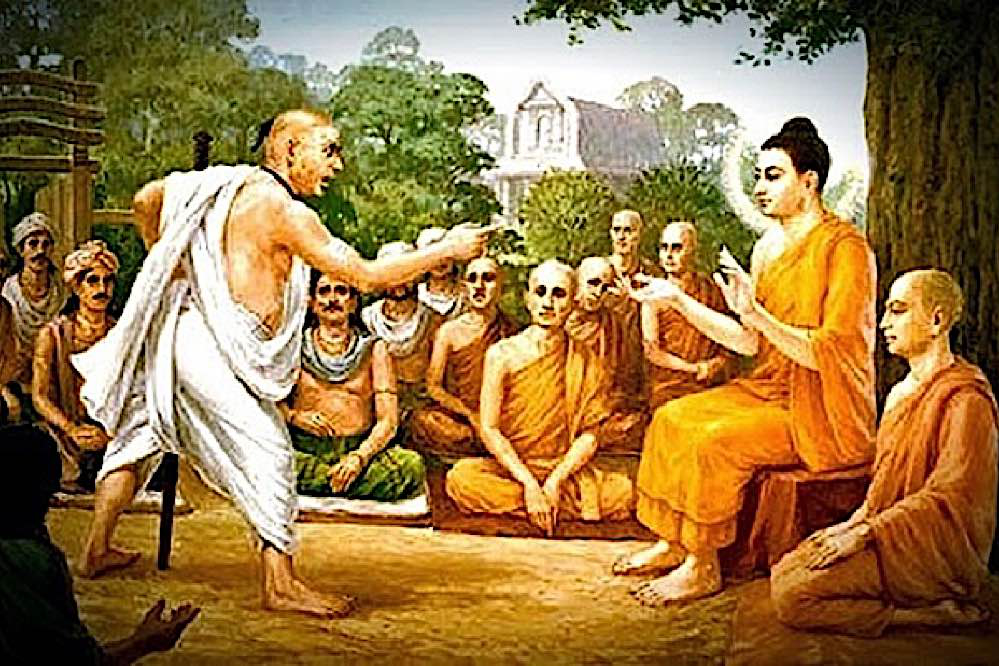When the Buddha Didn’t Speak, and Why
Towards the end of Part One of this article I looked in some detail at a debate between the Buddha and a brahmin called Assalāyana. That debate began with Assalāyana’s statement:
Only brahmins are the highest caste; other castes are inferior. Only brahmins are the light caste; other castes are dark. Only brahmins are purified, not others. Only brahmins are Brahmā’s rightful sons, born of his mouth, born of Brahmā, created by Brahmā, heirs of Brahmā.’ What do you say about this?
And we saw how the Buddha showed, with reasoned argument, that the brahmins were not in fact superior to the other castes. But there is one part of Assalāyana’s statement – which he repeats a number of times – that the Buddha doesn’t challenge: the assertion that only brahmins are born of Brahmā, created by Brahmā. The Buddha didn’t share this belief, so why didn’t he challenge Assalāyana on this? Obviously I can’t know the answer, not having access to the Buddha’s thought processes, but there are a few possible reasons for this. It could be that he simply considered it not worth arguing over. After all, how could it be proven one way or the other? Or it could be that, as the belief in Brahmā was so fundamental to the brahmins, it would have been useless to challenge it, even a little cruel. Another possibility is that it would have been a distraction from the Buddha’s main point, that all people, no matter what caste they ‘belonged’ to, were able to gain Enlightenment.
There is another sutta in which the Buddha explains his criteria for communication, which may throw some light on this. A prince, by the name of Abhaya, was encouraged by a Jain teacher to refute the Buddha in a discussion, as this would earn him a very good reputation, and he explains how to do this. He should ask the Buddha if he might ever say anything that would be disliked by others. If he replies that he might, then Abhaya can make the point that the Buddha therefore is no different from ordinary (that is, unenlightened) people. If, however, he says that he wouldn’t say anything that would be disliked by others, Abhaya can remind him of an occasion when he did say something to Devadatta (an erstwhile disciple) that the latter intensely disliked – so much so that thereafter he became a lifelong enemy of the Buddha.
When you put this dilemma to him, the Buddha won’t be able to either spit it out or swallow it down. He’ll be like a man with an iron cross stuck in his throat, unable to either spit it out or swallow it down.1
The prince agrees to do this, approaches the Buddha, and asks the question. The Buddha replies “this is no simple matter”, at which Abhaya says “then the Jains have lost”! This surprises the Buddha and he asks him what he means, so Abhaya repeats the conversation he had with the Jain teacher. Abhaya happens to be holding his baby, and the Buddha asks him a question. If a pebble or a stick were caught in the baby’s mouth, what would he do? Abhaya answers that he would take it out, even if doing so was painful for the baby, even if it drew blood. So then the Buddha explains his criteria for speaking or remaining silent. He uses three categories: true/false; harmful/beneficial; liked/disliked by others. The clearest way of explaining this is with a table, with the categories in the upper row, and whether or not the Buddha speaks in the lower:
| True | False | Beneficial | Harmful | Liked | Disliked |
| Yes | No | Yes | No | Yes | Yes |
The Buddha only speaks when he knows something to be both true and beneficial, whether or not it’s liked by others. This means that he won’t say anything he knows to be true if he thinks it will be harmful to the person hearing it. You might ask, How can the truth be harmful? Let’s return to Assalāyana and his assertion that only brahmins are born of Brahmā. If the Buddha had challenged him on this, what may have been the result, given that it’s a fundamental belief of the brahmins? I think it’s a very strong possibility that Assalāyana and his fellow brahmins would have fiercely disagreed with him, which would have rendered him/them unwilling to listen to anything else the Buddha may have said.
However, the Buddha also includes a caveat. He says to Abhaya that, even when he knows that what he’ll say is true, and that it will be beneficial for his hearer, he also ‘knows the right time’ to say it. This is connected with the last category – whether or not what he says will be liked. Notice that in the table above the Buddha speaks irrespective of whether or not his hearer will like what he says. But we know from our own experience that if we think someone is going to dislike what we have to tell them, we had better choose our moment well. Human beings have a tendency to reject ideas or facts that they dislike, even when they are true and would ultimately help them. Speaking ‘at the right time’ means speaking when you think they are most likely to be receptive.
Surprisingly (and perhaps, you may think, unbelievably) Assalāyana becomes a disciple of the Buddha at the end of their debate. Yet he presumably still holds the belief that brahmins are born from Brahmā, at least he hasn’t explicitly renounced that belief. Which means that either the Buddha doesn’t think it matters very much, or that he considers that this is not the time to speak of it, and that he will take it up with Assalāyana on another occasion, when the time is right.
How the Buddha Responded to Discourtesy and Abuse
So far everyone who has debated with the Buddha in this article has been friendly and courteous, even if their motivation was to ‘win’, and even if they did try to trick him. This was not always the case. There was an occasion when a brahmin called ‘Bharadvāja the Insulter’(!) had heard that a fellow brahmin had become a disciple of the Buddha.
Angry and displeased he went to the Buddha and abused and insulted him with rude, harsh words.2
The Buddha’s response is very interesting. He asks Bharadvāja a series of questions:
“What do you think, brahmin? Do friends and colleagues, relatives and family members, and guests still come to visit you?”
“Sometimes they do, Master Gotama.”
“Do you then serve them with a variety of foods and savories?”
“Sometimes I do.”
“But if they don’t accept it, brahmin, who does it belong to?”
“In that case it still belongs to me.”
“In the same way, brahmin, when you abuse, harass, and attack us who do not abuse, harass, and attack, we don’t accept it. It still belongs to you, brahmin, it still belongs to you!
The Buddha then goes on to say something about mutual hostility:
Someone who, when abused, harassed, and attacked, abuses, harasses, and attacks in return is said to eat the food and have a reaction to it. But we neither eat your food nor do we have a reaction to it. It still belongs to you, brahmin, it still belongs to you!
Bharadvāja then remarks that, although the Buddha is said to be fully enlightened, he still gets angry. Perhaps, because Bharadvāja is himself so furious, when the Buddha responds firmly, he assumes that he is too. But the Buddha denies that he’s angry and follows up with a verse, which includes:
When you get angry at an angry person
you just make things worse for yourself.
When you don’t get angry at an angry person
you win a battle hard to win.
When you know that the other is angry,
you act for the good of both
yourself and the other
if you’re mindful and stay calm.
People unfamiliar with the teaching
consider one who heals both
oneself and the other
to be a fool.
To restrain your urge to be angry in reaction to your opponent’s anger is to “win a battle hard to win”, that is, a battle against yourself. As the Buddha said on another occasion, better than victory over a thousand men is victory over oneself.3
There is another case of someone being discourteous to the Buddha, involving Saccaka once again, who we encountered in Part 1 of this article. In the midst of a discussion Saccaka says
I have confidence in Master Gotama thus: ‘Master Gotama is developed in body and developed in mind.’4
On the face of it this looks as if he is saying something respectful, but judging by the Buddha’s reply, it must have been sarcasm:
Surely, Aggivessana, your words are offensive and discourteous, but still I will answer you.
I like that response because the Buddha shows Saccaka that he is well aware of his discourtesy, but continues to engage with him courteously. At the end of their conversation Saccaka says
It’s incredible, Master Gotama, it’s amazing! When Master Gotama is repeatedly attacked with inappropriate and intrusive criticism, the complexion of his skin brightens and the color of his face becomes clear, just like a perfected one, a fully awakened Buddha.
He goes on to say that he had debated with many of the other famous teachers in India at that time and, according to him “they all dodged the issue, distracting the discussion with irrelevant points, and displaying annoyance, hate, and bitterness.” Whether this is true or is simply Buddhist propaganda, I’m sure we can all recall times when someone has reacted in this way. What is more interesting is what Saccaka notices about the Buddha when he is attacked. His skin brightens and the colour of his face becomes clear. The operative Pali word is vippasīdati, which means not only ‘becomes clear or bright’ but also ‘to be joyful’. Presumably the clarity and brightness of the Buddha’s face is the outward expression of his joy. This is strange – why would the Buddha become joyful when his interlocutor is being ‘offensive and discourteous’? We can imagine someone being attacked or criticised unfairly, and restraining themselves from retaliating in kind, and perhaps we’ve witnessed someone acting in this way. But becoming joyful? That may seem perverse, masochistic.
I think the answer lies in the nature of the Buddha’s compassion. If a person verbally attacks another, criticising them unfairly, perhaps insulting them, they are obviously in a negative state of mind, which will be unpleasant for them. In other words, they will be suffering. The most appropriate response to someone who is suffering is compassion. But what is compassion from the Buddhist point of view? In his book Compassion and Emptiness, Bhikkhu Analayo makes the point that compassion (karuna) is not empathy. To empathise with another’s suffering is to suffer with them. When we empathise with someone who is feeling sad, we feel sad with them. But, according to Analayo,
… compassion does not mean to commiserate to the extent of suffering along with the other […]
The cultivation of compassion … finds its expression in the wish for the other to be free from dukkha [suffering]. In this way, the mind takes the vision of freedom from affliction as its object. Such an object can generate a positive, at times even a joyful state of mind, instead of resulting in sadness.5
So perhaps when someone is rude or verbally attacks the Buddha, what he sees is their suffering, and he imagines and wishes for them to be free of their suffering.
This interpretation is supported by a strange story the Buddha tells Assalāyana after he has admitted defeat. In this story seven brahmin hermits are living in leaf huts in the wilderness, and all hold the same view that Assalāyana had held – that brahmins are superior to the other castes. One day a mysterious figure called Devala the Dark appears in their courtyard, saying “where have those brahmin hermits gone? where have those brahmin hermits gone?” The brahmins curse Devala, wishing him to turn to ashes, but the more they curse him the more attractive, good-looking, and lovely Devala becomes. This causes the brahmins to doubt their spiritual practices, because in the past, when they cursed someone, they did in fact turn to ashes. Devala assures them that their spiritual practices are not in vain, but asks them to let go of their malevolence towards him. They do so, and Devala then asks them a series of questions, in the same way that the Buddha does when he debates, at the end of which the brahmins, like Assalāyana, let go of their belief in their superiority.
Although a strange story, it expresses an important principle: if someone is hostile towards you in a discussion, don’t retaliate with hostility. Instead, try to bear in mind they are suffering, cultivate compassion for them, and ask them to let go of their hostility towards you. Only then can you have a constructive discussion.
This is a very difficult thing to do if you’re not a Buddha. We would have to make sure that what we were feeling really was compassion and not a kind of condescending gloating in their discomfort and bad behaviour. Such an attitude would be like a red rag to a bull. No, we would have to feel genuinely concerned for them, and sincerely wish for them to be freed from their current negative state, which would only be possible if we drop the desire to ‘win’. To move from adversary to companion.
When your opponent won’t listen
In their book How to Have Impossible Conversations Lindsay and Boghossian advise you to ‘walk away’ if the person you’re talking to isn’t engaging in an honest way with you. I don’t know of any instances in which the Buddha had to walk away from someone he was debating with, but there was one time when he walked away from some of his bhikkhu (ordained) disciples who weren’t prepared to listen to him. According to this account, they had fallen out with one another and “were arguing, quarreling, and fighting, continually wounding each other with barbed words.” The Buddha was informed of this and was asked to speak to them “out of compassion”, which he did. However, they defied him, telling him to go and enjoy his pleasant life, they would be responsible for the situation. The Buddha tried three times to get them to stop quarreling, but it was no good, they wouldn’t listen. So, knowing that he could do no more, he walked away from the situation.
How did he walk away? Frustrated, despairing, impatient, angry? That is unlikely, as the Buddha was not susceptible to negative mental states. There is another sutta which throws some light on this. In this sutta he gives the hypothetical example of a bhikkhu who has done something unethical. What should be done? He advises his disciples not to be in a hurry to accuse him, but to reflect on what may be the best course of action, given the kind of person he is, and he offers four factors to take into account: will I be troubled by doing this? Will he be hurt (because he tends to be irritable and hostile)? Does he hold fast to his views, and not let go of them easily? And do I think I can draw him away from the unethical and establish him in the ethical? The decisive factor is the last one. The fact that you may cause yourself some trouble, that he may be hurt, or that he tends to hold fast to his views and doesn’t let go of them easily – none of these are very important. If you think you can lead him from the unethical to the ethical, then go and speak to him. Although this advice is specifically about a case where someone has done something unethical, I think it also applies to someone who you think is seriously wrong about something. In any case, opinions often have an ethical dimension. That is, they have real life consequences, for good or bad.
Say you know someone who thinks that certain ideas are bad, and that anyone who holds those ideas should not be allowed to express them. They should be ‘cancelled’. Whereas you think that freedom of thought and speech are essential aspects of any healthy society. Is it worth making the effort to change their mind? To answer that question, ask yourself: Will it be troublesome for me to do that? Undoubtedly. Might they be hurt, because I know that they tend to be irritable and hostile when challenged? Probably. Do they hold fast to their view, meaning that it will be very difficult for them to let it go? Almost definitely. None of that should deter you. The decisive question is – do I think it’s possible to lead them away from this view, to a better one? If the answer is yes, then go and speak to them.
But if the answer is no? The Buddha then says “Don’t underestimate the value of equanimity for such a person.”6 Equanimity is defined as calmness and composure, especially in a difficult situation. But the Pali word upekkhā implies much more than that. It is one of four positive mental states that the Buddha taught and encouraged his disciples to cultivate, the others being benevolence or loving kindness, compassion, and sympathetic joy (rejoicing in another’s happiness or good fortune). The foundation is benevolence – the desire for every living thing to be at ease and happy. If you are established in benevolence, when you encounter suffering, your benevolence naturally becomes compassion. When you encounter happiness and good fortune, it becomes sympathetic joy. Equanimity is the pinnacle of these four states, which is to say that it includes benevolence, compassion, and sympathetic joy. So when the Buddha advises his disciples not to underestimate equanimity, he doesn’t mean merely staying calm and composed. He means, as Analayo puts it,
giving up attempts to control the situation and change it for the better. Instead one allows others to take responsibility for their own actions and attitudes… Compassion that can lead to equanimity, if needed, is no longer attached to its activities bearing fruit and being successful.
And this leads me to my final point.
Sitting loose to any outcome you may want
One of the things I noticed about my teacher, Sangharakshita, was that when he disagreed with someone, he did it with a smile and a twinkle in his eye. He maintained a friendly attitude throughout, and he did it lightly, as if he didn’t care whether or not the other person could be persuaded by him. He did care, I’m sure, but I don’t think he had any personal stake in the matter. It wasn’t important to him to ‘win’. So when someone disagreed with him there was no ‘stand off’, no sense of ‘preparing for battle’, no change in his demeanour or tone of voice. He continued speaking as if they were still in agreement. And I think his attitude was really helpful, because if it’s important to you to change the other person’s mind, to get them to come round to your point of view, (which of course we do if we enter into a debate with someone), you’ll be much more effective if there is nothing in it for you personally. If there is something in it for you personally – if your ego is involved – then you are more likely to get upset, frustrated and angry, and therefore unreasonable, which won’t help you.
And I think this may be the main thing that made the Buddha such a great debater (as well as that fact that he was very wise!): there was nothing in it for him personally. That is, he thought that the ideas his opponents promulgated were bad ones, in that they lead to suffering, not greater happiness, and so he tried his best to change their minds, for their sake and for the sake of their followers. But he also knew that it may not be possible, and if he didn’t succeed he didn’t feel dejected by that. Ultimately their opinions were their responsibility, not his. He could only talk to them.
For those of us who are unenlightened this is a very difficult attitude to cultivate and maintain. If, like me, you care deeply about the direction society seems to be going in, and you feel a need to speak out and challenge what you consider to be some very bad ideas, it’s difficult to maintain a positive, friendly, equanimous attitude. But then, what good will it do if you get angry with the person whose mind you’re trying to change? Will that help? Almost definitely not. So the only way forward seems to be this: talk to people you disagree with, have conversations with them, listen to them, be open to the possibility that you are wrong (you will almost definitely have got some things wrong) and be prepared to modify your position, do your best to encourage them to think again. And if you are unable to do the latter, don’t let it get you down, for how would that help anyone? Instead, cultivate equanimity – compassion, but with no attachment to a particular result. Argue like a Buddha.
Footnotes
- Abhaya Sutta, MN 58, translation Bhikkhu Sujato https://suttacentral.net/mn58/en/sujato
- Akkosa Sutta, SN 72, Translation Bhikkhu Sujato. https://suttacentral.net/sn7.2/en/sujato
- Dhammapada 103.
- Maha Saccaka Sutta, Translation Bhikkhu Bodhi, https://suttacentral.net/mn36/en/bodhi
- Compassion and Emptiness, Bhikkhu Analayao, 1. Cultivating Compassion. Windhorse Publications, 2015, Kindle Edition.
- Kinti Sutta, MN 103. The Middle Length Discourses of the Buddha, translation Bhikkhus Nanamoli and Bodhi, p.851. Wisdom Publications, 1995.



